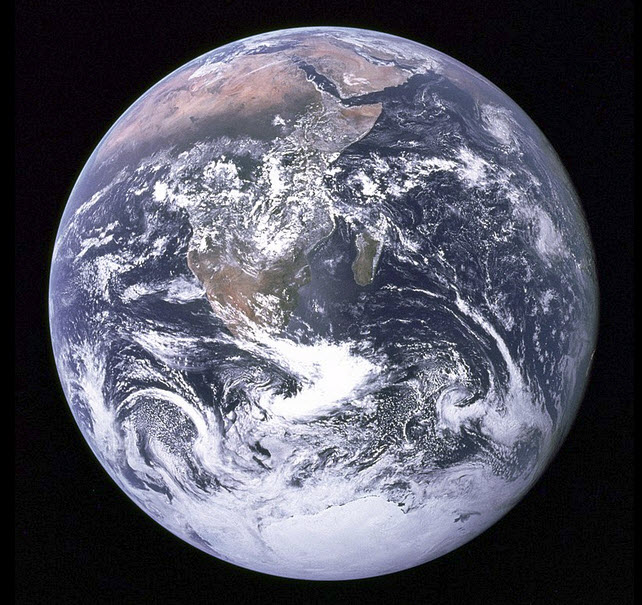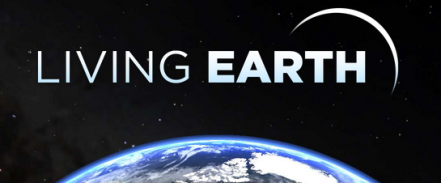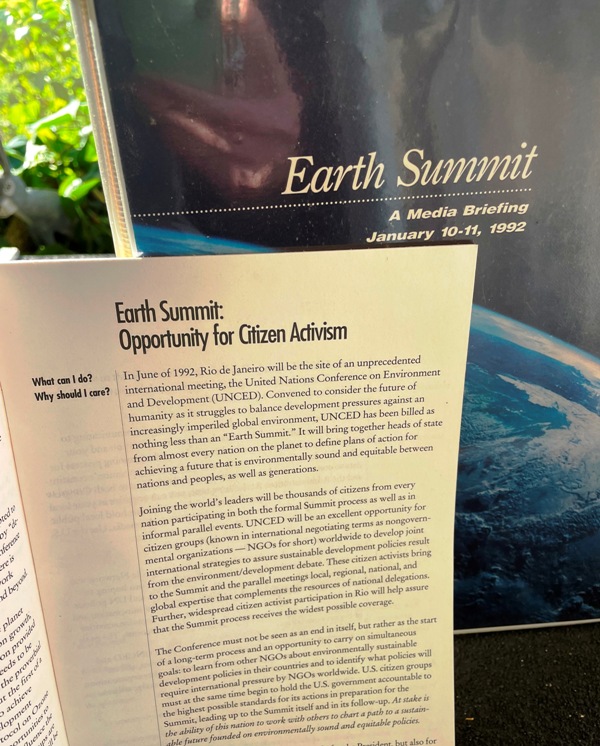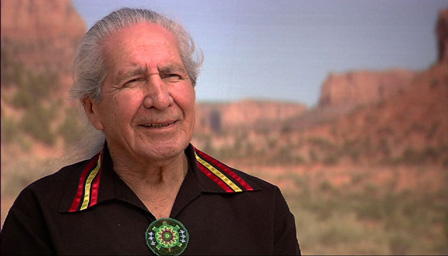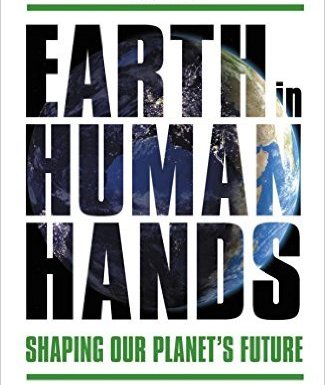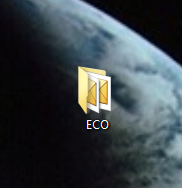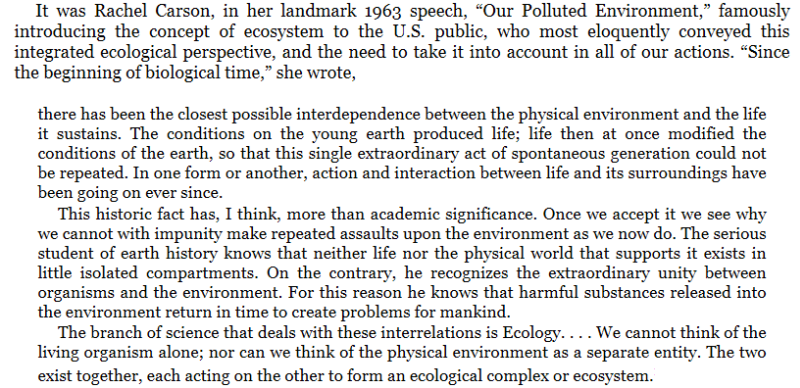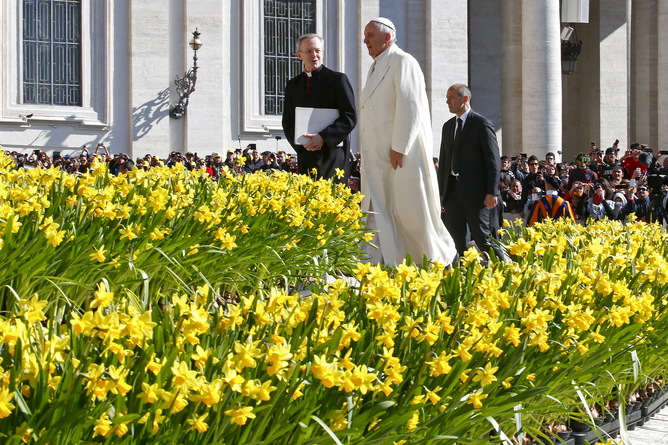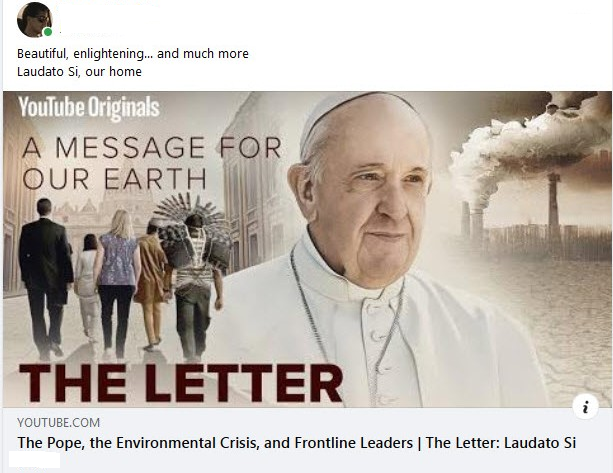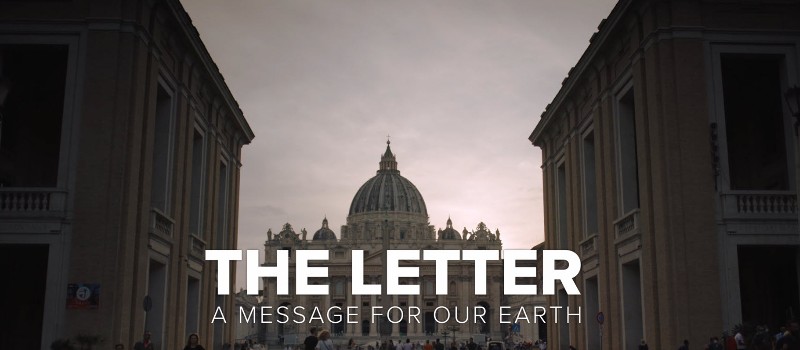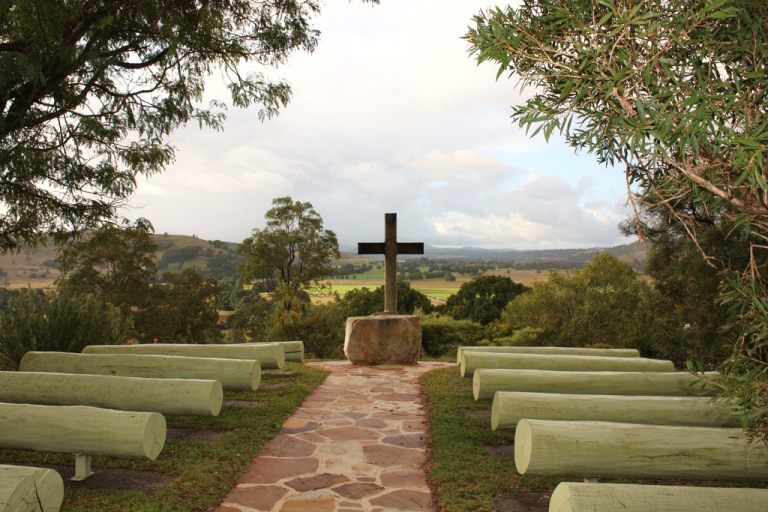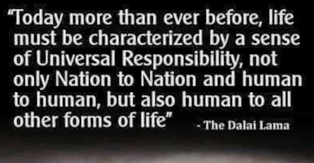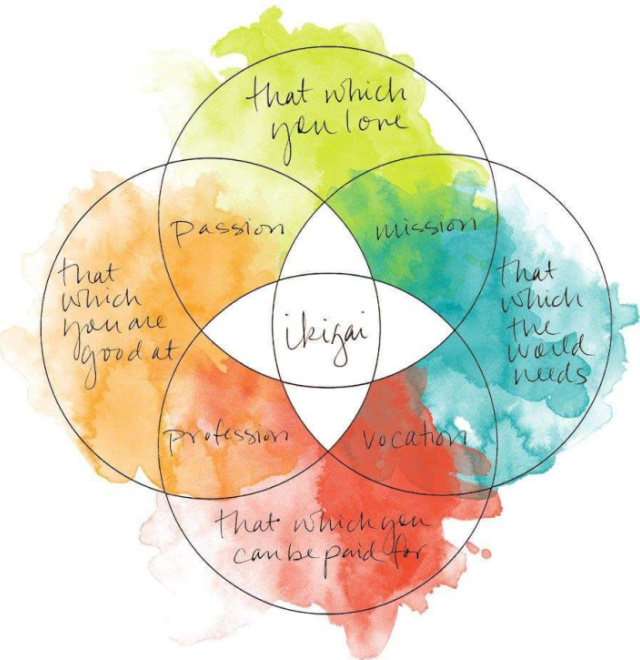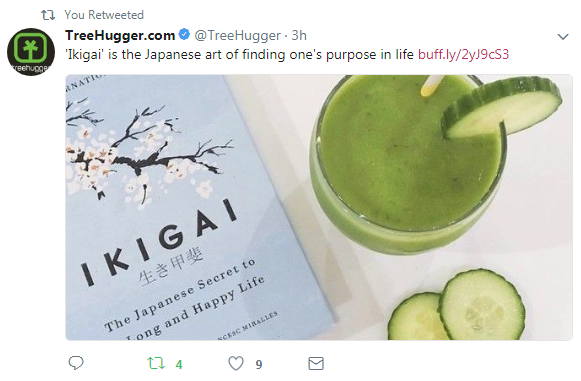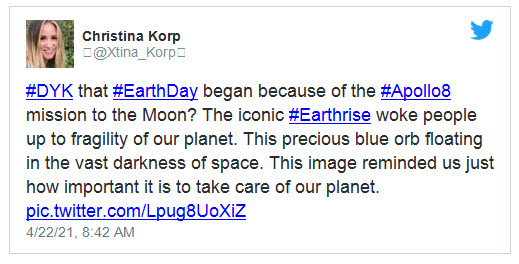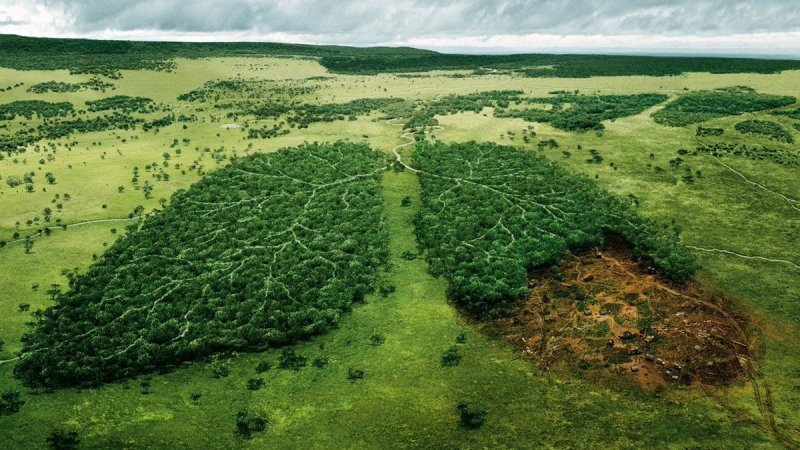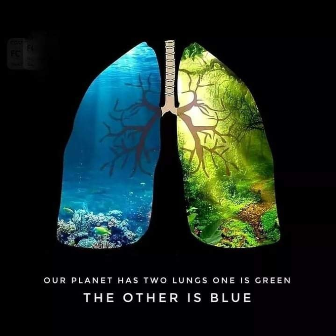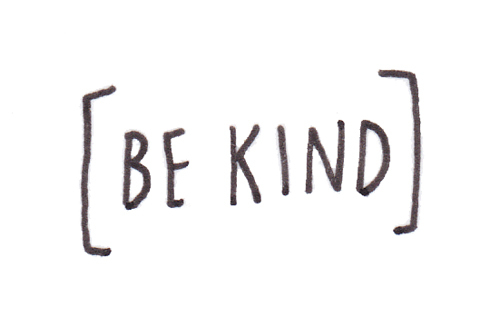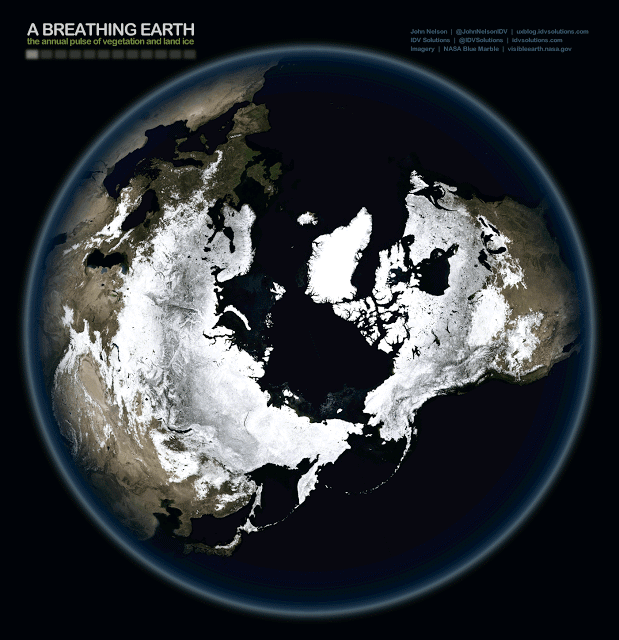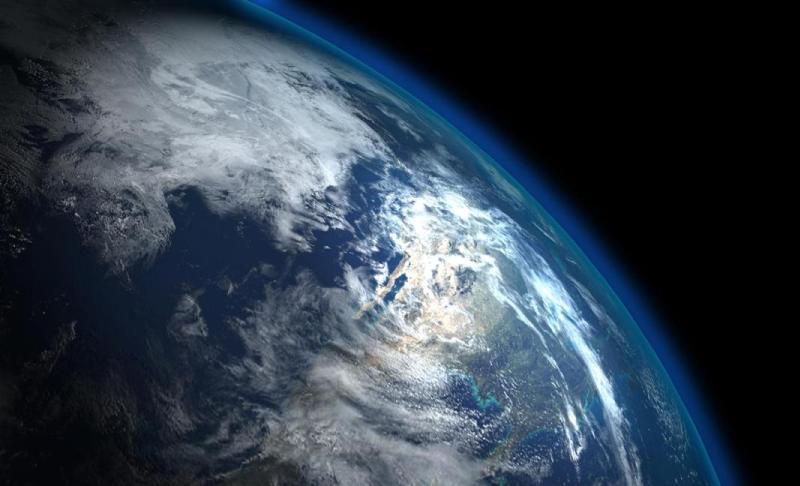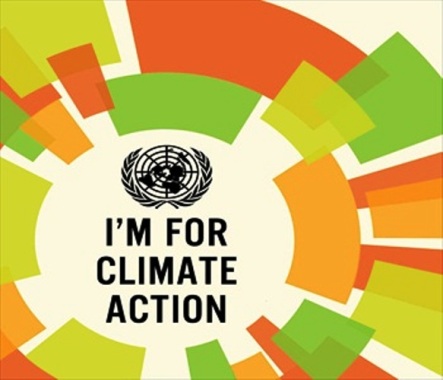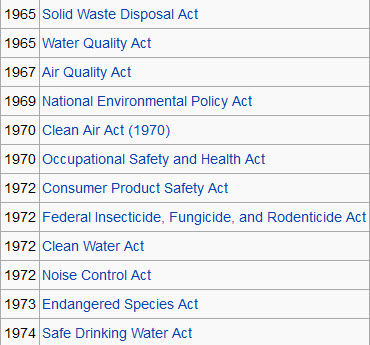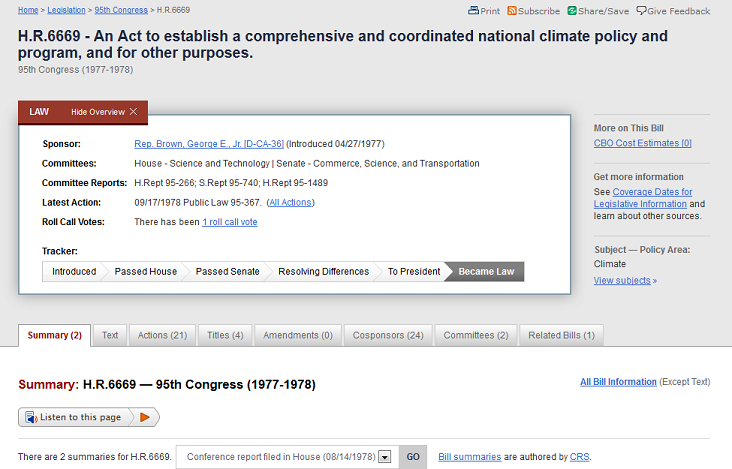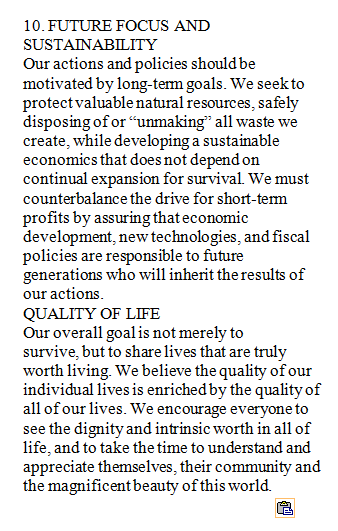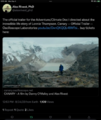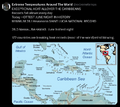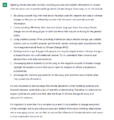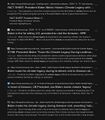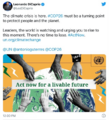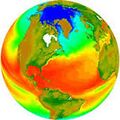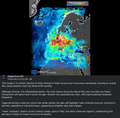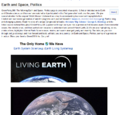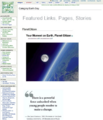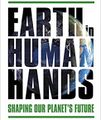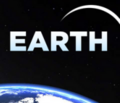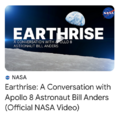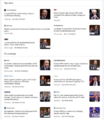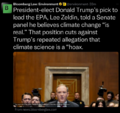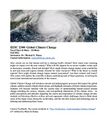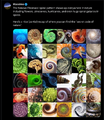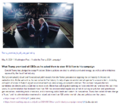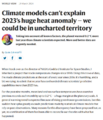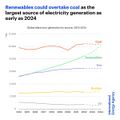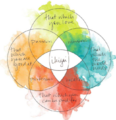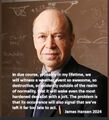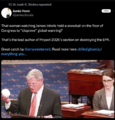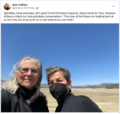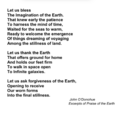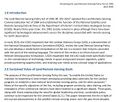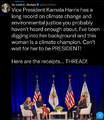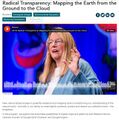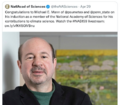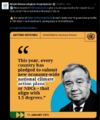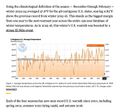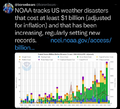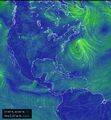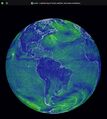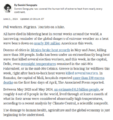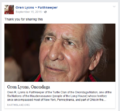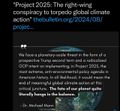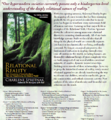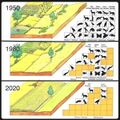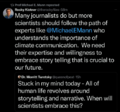Category:Eco-ethics
Planet Citizens / Scientists, Preserving & Protecting the Home Planet, Earth
- Eco-ethics @GreenPolicy360
- "Blue Marble", NASA / Via Apollo 17, 1972 - https://www.greenpolicy360.net/w/Apollo_17
GreenPolicy360.com & StrategicDemands.com:
- https://greenpolicy360.net/w/Category:Environmental_Security
- https://strategicdemands.com/environmental-security/
Earth Right Now | EarthPOV | Earth Observations
Steve Schmidt / GreenPolicy360 Siterunner: Eco-ethics is seen as a system of ethics, of values, principles, ideals that guide us as we act in our day-to-day lives. We see this as "vita activa", a life of action, politics, choices that we make individually and together. With your GreenPolicy360 founder, a young life of choices and political involvements led to what, in the 1990s I chose to call a 'values-based politics'. An eco-ethics and a green formative politics that became global resulted in a Green Platform, Green Politics, and continues on year after year, decade-to-decade. Here is a touch of this eco-story, now told with a personal perspective.
In the 1990s, in Santa Fe, a city named after St. Francis, I began drafting what became the founding platform of the U.S. Green Party. The U.S. Green Platform was, as I described it, a "values-based platform" and it was intended to set in place a foundation of values that Green politics shared. We looked to "key values" and an international Green parties "four pillars". As I wrote I envisioned a "politics of values" that could be applied to "the issues" of the day, the questions of the day, and this would, with integrity (as opposed to money-in-politics, influence-buying and/or opportunism) bring forward a "call to action" with Green positions. Not an ideologically determined document, drawn to be 'political correct', but a democratic statement reflecting life-affirming hopes and beliefs that was an eco-ethics, a vision of a better world and how to make a positive difference in our 'vita activa', our daily actions.
It's always good to see how our day-to-day choices and actions are part of multiple threads, a tapestry woven by kindred groups and causes, religions and movements. So, with respect, let's look at some who share eco-ethics, a 21st century vision, a legacy we hope to send forward to coming generations.
A 'Values-based' Green Politics
Earth Day Memories on the 50th Anniversary
Earth Charter -- https://en.wikipedia.org/wiki/Earth_Charter
The Earth Charter is an international declaration of fundamental values and principles considered useful by its supporters for building a just, sustainable, and peaceful global society in the 21st century. Created by a global consultation process, and endorsed by organizations representing millions of people, the Charter "seeks to inspire in all peoples a sense of global interdependence and shared responsibility for the well-being of the human family, the greater community of life, and future generations."[1] It calls upon humanity to help create a global partnership at a critical juncture in history. The Earth Charter's ethical vision proposes that environmental protection, human rights, equitable human development, and peace are interdependent and indivisible. The Charter attempts to provide a new framework for thinking about and addressing these issues. The Earth Charter Initiative organization exists to promote the Charter.
The idea of the Earth Charter originated in 1987, by Maurice Strong and Mikhail Gorbachev as members of The Club of Rome, when the United Nations World Commission on Environment and Development called for a new charter to guide the transition to sustainable development. In 1992, the need for a charter was urged by then-Secretary General Boutros Boutros-Ghali at the Rio de Janeiro Earth Summit, but the time for such a declaration was not believed to be right. The Rio Declaration became the statement of the achievable consensus at that time. In 1994, Strong (Chairman of the Earth Summit) and Gorbachev, working through organizations they each founded (the Earth Council and Green Cross International respectively), restarted the Earth Charter as a civil society initiative, with the help of the government of the Netherlands.
The drafting of the text was done during a six-year worldwide consultation process (1994–2000), overseen by the independent Earth Charter Commission, which was convened by Strong and Gorbachev with the purpose of developing a global consensus on values and principles for a sustainable future. The Commission continues to serve as the steward of the Earth Charter text.
Earth Charter Principles
The four pillars and sixteen principles of the Earth Charter are:
I. Respect and Care for the Community of Life
Respect Earth and life in all its diversity.
Care for the community of life with understanding, compassion and love.
Build democratic societies that are just, participatory, sustainable and peaceful.
Secure Earth's bounty and beauty for present and future generations.
II. Ecological Integrity
Protect and restore the integrity of Earth's ecological systems, with special concern for biological diversity and the natural processes that sustain life.
Prevent harm as the best method of environmental protection and, when knowledge is limited, apply a precautionary approach.
Adopt patterns of production, consumption and reproduction that safeguard Earth's regenerative capacities, human rights and community well-being.
Advance the study of ecological sustainability and promote the open exchange and wide application of the knowledge acquired.
III. Social and Economic Justice
Eradicate poverty as an ethical, social and environmental imperative.
Ensure that economic activities and institutions at all levels promote human development in an equitable and sustainable manner.
Affirm gender equality and equity as prerequisites to sustainable development and ensure universal access to education, health care and economic opportunity.
Uphold the right of all, without discrimination, to a natural and social environment supportive of human dignity, bodily health and spiritual well-being, with special attention to the rights of indigenous peoples and minorities.
IV. Democracy, Nonviolence, and Peace
Strengthen democratic institutions at all levels, and provide transparency and accountability in governance, inclusive participation in decision-making, and access to justice.
Integrate into formal education and lifelong learning the knowledge, values and skills needed for a sustainable way of life.
Treat all living beings with respect and consideration.
Promote a culture of tolerance, nonviolence and peace.
🌎
○ "Be kind whenever possible. It is always possible." -- Dalai Lama
○ "Kindness in words creates confidence. Kindness in thinking creates profoundness. Kindness in giving creates love." -- Lao-Tsu, https://en.wikiquote.org/wiki/Laozi
🌎
The Challenge of Choosing to Protect The Commons
- Acting with a vision for today -- and of tomorrow
Ancient Wisdom
Indigeneity, Indigenous Peoples Act with Understanding
Generational Thinking, Sustainable Living
🌎
- A Modern Eco-Movement
- Community-to-Community, Sharing across Differing Communities, Cultures, Nations & Religions
Going Green / 'GreenAction'
Each of us can make a positive difference by stepping up & doing our best
🌎
* https://www.greenpolicy360.net/w/File:ECO.png
Eco Definition
German zoologist Ernst Haeckel, who in 1866 coined the term oekologie from the Greek oikos, meaning “home, place to live.” Haeckel was thinking primarily of the “homes” of animals, but by the time the word translated into English in 1875 (initially spelled “oecology”), its meaning had broadened to embrace plant habitats as well.
The related term ecosystem was proposed by the British botanist Arthur Tansley, 60 years after one of his own professors first translated Haeckel’s oekologie. It may have been ecosystem, which treats eco- as a prefix to a standard English word, that gave English speakers permission to do the same in coining a host of other terms... (Via Merriam-Webster)
Ecosystem becomes a term of a movement, a modern environmental movement, a whole earth movement...
Whole Earth, the Home Planet
🌎
Interfaith Dialogue
Throughout the world there are local, regional, national and international interfaith initiatives; many are formally or informally linked and constitute larger networks or federations. The often quoted statement "There will be no peace among the nations without peace among the religions. There will be no peace among the religions without dialogue among the religions" was formulated by Hans Küng, a Professor of Ecumenical Theology and President of the Global Ethic Foundation.[1] Interfaith dialogue forms a major role in the study of religion and peacebuilding.
🌎
Biblical 'Stewardship' of Earth and a Virtuous Life ....
A Catholic Pope (who names himself after St. Francis, a 'patron saint of the environment and life on earth') and who writes and offers up the first eco-encyclical doctrine in the Church's long history
Laudato Si, an Eco-Encyclical Letter
The Letter: Laudato Si
- The Pope, the Environmental Crisis, and Frontline Leaders
🌎
East and West, North and South, a Whole Earth
Remembering 75 Years Ago
🌎
Within the Protestant Christian Tradition
🌎
Buddhists Raise Voices for Peace, Service and Environmental Life Protection
The Buddha said, “It is important to renew humanity.” I like that vision. How do we renew humanity? And he made three recommendations. He said generosity, truthful and constructive speech, and a life of service and compassion are the things which shall renew humanity." -- Roshi Joan Halifax, Upaya Zen Center, New Mexico
- On the great road of Buddha ancestors,
- there is always unsurpassable practice, continuous and sustained.
- It is the circle of the way and is never cut off.
- Between aspiration, practice, enlightenment, and nirvana,
- there is not a moment’s gap;
- continuous practice is the circle of the way.
- This being so, continuous practice is unstained,
- not forced by you or others.
- The power of this continuous practice confirms you as well as others.
- It means your practice affects the entire earth
- and the entire sky in the ten directions.
- Although not noticed by others or yourself, it is so.
- — Dogen
○
Soka Gakkai International (SGI) / Nichiren Buddhist
The belief of the Soka Gakkai centers on recognizing that all life has dignity with infinite inherent potential; this immanent "Buddhahood" exists in every person and can be awakened through the Buddhist practice prescribed by Nichiren. Further, a person's social actions at every moment can lead to soka, or the creation of value (the theory of the interdependence of life). Societal change is facilitated through "human revolution", a way of living in the world that creates value.
Ikeda's vision for the SGI was described in 2010 by Olivier Urbain, then director of the Toda Peace Institute founded by Ikeda, as a "borderless Buddhist humanism that emphasizes free thinking and personal development based on respect for all life."
○
Ikigai
Ikigai: Reason for Being
Love | mission | vocation | profession | passion
— What you are good at — What you love — What the world needs — What you can be paid for
🌎
A New Vision of Life on Earth -- Earthrise
- As Planet Citizens We See Our Home Planet in a New Light
Beginnings of the Modern Environmental Movement
Planet Citizen Vision of Living Earth
GreenPolicy360 Page Highlights
🌎
Planet Citizens
- Time for Planet Citizen Action
A Call to Action to Preserve & Protect Life on Earth...
- Your Life Is Your Message
Planet Citizen Service
🌎
Strategies of Resilience & Survival
🌎
See the Big Picture, It's All Connected
- SJS / GreenPolicy360 Siterunner: As interconnected Planet Citizens our challenge is to improve our Quality of Life and Secure our Common Future...
- Launch new initiatives, improve the environment, change the way governments run, impact and transform how businesses work
- We encourage you to join in, dream and create your own green stories venturing on and making a positive difference every day
- Now is time to go beyond old ways of thinking and shape new visions of our communities and our living home -- Planet Earth
PlanetCitizen.org / Earth System Science / Measuring "Vital Signs"
- 🌎
Planetary Awareness www.planetaryawareness.org
·························································································································
Pope Francis speaks of Climate, Politics, Personal Responsibility
"It would be sad, and dare I say even catastrophic, were special interests to prevail over the common good and lead to manipulating information in order to protect their own plans and interests"...
- "The Pope took particular aim at those who reject the science behind global warming..."
Pope Francis on the Environment
🌎
Climate Action: An Ethical Responsibility
- Beyond Preparing for Crisis Management
Biodiversity, Protecting Life
Planetary Health Pledge / Via The Lancet (2020)
Green 'Vita Activa'
Climate Problems, Climate Solutions
Beginnings of U.S. Climate Science and Action to Protect & Preserve a Healthy & Sustainable Planet
Via the Ethics Institute at Penn State College of the Liberal Arts ... In 1977, Robert M. White, the head of the National Oceanic and Atmospheric Administration, wrote a report for the National Research Council a branch of the National Academy of Sciences that concluded that CO2 released during the burning of fossil fuel could have consequences for climate that pose a considerable threat to future society. (White, 1978)
- Your GreenPolicy360 remembers the National Academy report of 1977 and what followed immediately from Congressman George E. Brown -- the formal beginnings of government climate change study ... For more about the 1977/78 Congressional climate legislation and climate plan and the array of Congressional environmental science, programs and actions set in motion beginning in the late 1960's, visit GreenPolicy360's page (and links) in memory of George Brown -- https://www.greenpolicy360.net/w/George_E._Brown_Jr
A government report prepared ... in 1981 declared that "[t]he responsibility of the carbon-dioxide problem is ours - we should accept it and act in a way that recognizes our role as trustees for future generations." (Charney et al., 1979) This report also estimated that the amount of warming that would be experienced from a doubling of the pre-industrial levels of CO2 would be 3 degrees C, very close to the amount that the "Intergovernmental Panel on Climate Change" would predict almost 30 years later." (Charney et al., 1979)
For over thirty-five years, the US Academy of Sciences has warned the US about the enormous threats of climate change with each successive report making stronger claims that human caused climate change is a serious threat to civilization. If the United States can be accused of failing to live up to its ethical responsibilities to the rest of the world on climate change, one cannot blame the US Academy of Sciences for failing to ring alarm bells. US citizens cannot claim that their most prestigious scientific institutions have failed to take a position on the seriousness of climate change.
The failure of the United States to respond to climate change can be attributed in largest part to a well-financed, well-organized climate change disinformation campaign. As ClimateEthics has previously cited, see "A New Kind of Crime Against Humanity?: The Fossil Fuel Industry's Disinformation Campaign On Climate Change". (Donald Brown, 2010a)
ClimateEthics has also repeatedly argued that the failure of the United States to respond to its ethical duties for climate change may also be attributed to the almost complete failure in the United States of the media and even climate change policy advocates to acknowledge that climate change raises not only national interests but also duties, responsibilities, and obligations to others.
See, for example, "Are Ethical Arguments for Climate Change Action Weaker Than Self-Interest Based Arguments? Why Taking Ethical Arguments Off the Table Is Like A Soccer Team Unilaterally Taking The Goalie Out of the Net. (Brown, 2010b)
- The Ethics and Climate site contains over 185 articles (as of 2017) including 13 videos on ethical issues raised by climate change. The site seeks to help policy makers and interested citizens understand the ethical dimensions of climate change issues in contention in policy debates.
- ○ ○ ○ ○ ○ ○ ○ ○ ○ ○ ○ ○ ○ ○ ○
Ethics and The National Academy of Sciences
If climate change must be understood as a civilization challenging ethical issue, can the US Academy reports on climate change be criticized on ethical grounds?
The US Academy reports acknowledge that climate change has serious adverse world-wide impacts, that is impacts outside the United States. For instance, in its most recent report, the US Academy concluded that climate change would cause the following world-wide impacts:
• Water availability will decrease in many areas that are already drought-prone and in areas where rivers are fed by glaciers or snowpack;
• A higher fraction of rainfall will fall in the form of heavy precipitation, increasing the risk of flooding and, in some regions, the spread of water-borne illness;
• People and ecosystems in coastal zones will be exposed to higher storm surges, intrusion of salt water into freshwater aquifers, and other risks as sea levels rise;
• Coral reefs will experience widespread bleaching as a result of increasing temperatures, rising sea levels, and ocean acidification.
Climate Change is an Ethical Problem
○ ○ ○ ○ ○ ○ ○ ○ ○ ○ ○ ○ ○ ○ ○ ○ ○ ○ ○
- Read more re: initial climate change study and science
- In the UK
- https://www.wired.com/story/meet-the-amateur-scientist-who-discovered-climate-change/ -- About Guy Callendar
- In the US
- http://www.greenpolicy360.net/w/File:US_Public_Law_95-367.png -- At the beginning...
🌎
An Initial Climate Study/Report: Historic
Energy and Climate Report, 1977, National Academy of Sciences / 175 pp. / PDF via GreenPolicy360
Congressman Brown / Science Committee in Front of Climate Action
SJS / GreenPolicy360 Siterunner: My friend George E. Brown, from the 1960s to 1999 lived his life with a vision of what could be. His actions were a model ...
George Brown, one planet citizen, in action ....
National Climate Program Act, 1978 / PDF
- The first federal program established to study and assess scientifically the issues and risks of human-caused climate change
🌎
In the US Green Party founding platform (2000)
GreenPolicy Siterunner / SJS: From the Green Party's platform, as drafted by GreenPolicy360's Siterunner
🌎
@GreenPolicy360
Oren Lyons, Chief of the Onondaga Iroquois Nation, speaks of ancient wisdom:
- "We are looking ahead, as is one of the first mandates given us as chiefs, to make sure and to make every decision that we make relate to the welfare and well-being of the seventh generation to come...."
- "What about the seventh generation? Where are you taking them? What will they have?"
GreenPolicy Siterunner / SJS: Chief Lyons is one of our favorite Bioneers' who has joined with the Bioneers conference from its eary years in the 1990s -- and helped to open our eyes and hearts over many years
○ ○ ○ ○ ○ ○ ○ ○ ○
Today's Challenge
- Generational Thinking, Sustainable Living
"The eyes of the future are looking back at us and they are praying for us to see beyond our own time." -- Terry Tempest Williams
"We bring a Green Vision & Values-based Platform" (SJS)
Universal Declaration of Human Rights
🌎
Subcategories
This category has the following 17 subcategories, out of 17 total.
A
B
C
E
G
N
O
P
W
Pages in category "Eco-ethics"
The following 70 pages are in this category, out of 70 total.
E
- Earth and Space, Politics
- Earth Day
- Earth Day Is Every Day
- Earth Day Memories on the 50th Anniversary
- Earth Imaging-New Space
- Earth Science Research from Space
- Earthrise
- Earthviews from Astronauts
- Ecolivia
- Environmental Law, Rollbacks under Trump 2016-20
- Environmental Laws and Modern Environmental Movement
- EOS eco Operating System
- Ethics and Climate Change
F
G
- Going Green
- Google Earth
- Green New Deal
- Green Politics 360
- Green Quotes
- Green Stories of the Day
- GreenAction
- Greening Our Blue Planet
- GreenLinks
- GreenPolicy360 Archive Highlights 2013
- GreenPolicy360 Archive Highlights 2014
- GreenPolicy360 Archive Highlights 2015
- GreenPolicy360 Archive Highlights 2016
- GreenPolicy360 Archive Highlights 2017
- GreenPolicy360 Archive Highlights 2018
- GreenPolicy360 Archive Highlights 2019
- GreenPolicy360 Archive Highlights 2020
- GreenPolicy360 Archive Highlights 2023
- GreenPolicy360 Archive Highlights 2024
P
Media in category "Eco-ethics"
The following 200 files are in this category, out of 240 total.
(previous page) (next page)- 'Thin Blue Layer' of Earth's Atmosphere 2.jpg 800 × 486; 46 KB
- 2001 pic1.jpeg 1,920 × 1,080; 268 KB
- 2001 pic3.jpeg 800 × 450; 65 KB
- 3M lawsuit re forever chemicals - June 2023.png 603 × 600; 357 KB
- A Brief History of the Future - 2s.jpg 448 × 309; 70 KB
- A Planet Citizen View.png 799 × 1,241; 1.64 MB
- A root and its mycorrhizal fungus surroundings.PNG 315 × 382; 236 KB
- A War on Science.png 800 × 389; 705 KB
- About Baselines and Change.png 592 × 312; 33 KB
- Apollo 8, Life Jan10,1969.png 480 × 635; 515 KB
- Battle for Democracy.jpg 640 × 123; 24 KB
- Be kind-2.jpg 250 × 164; 20 KB
- Be kind.jpg 500 × 327; 47 KB
- Biden re Earth Day 2023.png 640 × 400; 155 KB
- Biggest climate related legislation in history - 1.png 800 × 188; 68 KB
- Bill-Perry-is-terrified.-Why-arent-you Jan2016.png 768 × 440; 109 KB
- Biodiversity COP15 Conference - Dec 2022.png 640 × 417; 637 KB
- Biodiversity COP15 News - 1.png 600 × 687; 288 KB
- Biodiversity COP15 News - 2.png 600 × 636; 340 KB
- Bioneers 2023 - ThirdAct.Org.jpg 624 × 600; 145 KB
- Bioneers 35.png 480 × 528; 356 KB
- Bioneers It's all connected - 30th annual conference.jpg 527 × 521; 79 KB
- Bucky Trimtab.jpg 348 × 336; 88 KB
- California's kelp forests and coastal biodiversity diminished.png 532 × 754; 307 KB
- Canary - 1.jpg 448 × 901; 144 KB
- Canary - 2.png 446 × 531; 264 KB
- Caribbean Sea hot - June night 2024.png 676 × 600; 386 KB
- Change.jpg 800 × 473; 73 KB
- ChatGPT talks of fighting climate denialism.png 707 × 747; 239 KB
- Citizen of the planet girl.jpg 400 × 265; 35 KB
- Climate Change from Space - Climate Kit via ESA - 2022.png 800 × 421; 651 KB
- Climate Legacy of Biden.jpg 600 × 687; 265 KB
- Climate Plans Enforcement - Resources - GreenPolicy.png 768 × 897; 686 KB
- Climate Summit - Leonardo DiCaprio.png 600 × 663; 521 KB
- ClimateNews 360.jpg 172 × 172; 9 KB
- CO2 photo.JPG 800 × 536; 88 KB
- Common Ground, the Movie.png 600 × 756; 775 KB
- Copernicus Sentinel over Europe.png 640 × 630; 410 KB
- Coral bleaching Great Barrier Reef 2016.jpeg 630 × 472; 91 KB
- Coral growing-Mott Lab,Florida.jpg 800 × 382; 114 KB
- Coral reef rejuvenation-montage.png 569 × 236; 318 KB
- Corita action.jpg 410 × 342; 42 KB
- Daisy Chain Hippie.jpg 564 × 362; 30 KB
- Dalai Lama on Our Responsibility.png 314 × 163; 60 KB
- DeSantis against climate science - 2.jpg 640 × 480; 122 KB
- DeSantis against climate science - again.jpg 460 × 640; 105 KB
- Doomism quote from Michael Mann - 2023.png 622 × 192; 51 KB
- Doomsday Clock - 2019.png 640 × 498; 366 KB
- Dr Leah Stokes - UCSB 2024.png 640 × 540; 779 KB
- Earth and Space, Politics.png 796 × 765; 349 KB
- Earth Breathing.jpg 800 × 450; 117 KB
- Earth conditions dynamic map.png 673 × 673; 770 KB
- Earth Day - Green Policy.png 600 × 700; 405 KB
- Earth Day 2020 - 50th Anniversary.png 800 × 1,033; 1.2 MB
- Earth Day Flag.png 400 × 267; 69 KB
- Earth Day memories.png 800 × 210; 381 KB
- Earth dynamic global map.png 555 × 480; 390 KB
- Earth Emoji.png 50 × 50; 2 KB
- Earth grassroots.jpg 374 × 238; 32 KB
- Earth in Human Hands.jpg 325 × 385; 34 KB
- Earth in Our Hands.png 76 × 76; 5 KB
- Earth Information Center - NASA 336.png 336 × 336; 279 KB
- Earth Information Center - NASA.png 768 × 769; 1.21 MB
- Earth s.png 194 × 167; 40 KB
- Earth-Day.png 336 × 336; 55 KB
- Earthrise (NASA original Anders photo ).png 665 × 723; 539 KB
- Earthrise - NASA - Astro Bill Anders.png 497 × 479; 216 KB
- Earthrise - NASA original Anders photo.png 665 × 723; 539 KB
- Earthrise book cover (2008).jpg 709 × 1,070; 401 KB
- Earthrise Planetary Awareness.jpg 768 × 992; 103 KB
- EleanorRooseveltHumanRights.png 535 × 423; 60 KB
- End of coal power in UK - 1.jpg 800 × 868; 112 KB
- End of coal power in UK - 2.png 800 × 557; 225 KB
- End of coal power in UK - 3.png 800 × 562; 240 KB
- End of Coal Power in UK.png 800 × 925; 739 KB
- EOS starliner gr2.png 320 × 91; 3 KB
- EPA and the Green Bank - Feb 2023.png 476 × 542; 244 KB
- EPA Lee Zeldin Hearing - 1.png 600 × 693; 304 KB
- EPA Lee Zeldin Hearing.png 637 × 600; 414 KB
- Every Day Is Earth Day.png 590 × 125; 30 KB
- Extreme temperature-world-May 2024.jpg 640 × 427; 105 KB
- Eyes On Global Security Threats - via Strategic Demands April 2022.png 600 × 776; 308 KB
- Facts about US Energy Use.jpg 697 × 600; 101 KB
- Florida 2024 Heating up and upset.jpg 460 × 581; 89 KB
- Florida governor and legislature strike climate science - 2024.png 640 × 105; 42 KB
- For Wildlife.jpg 444 × 640; 224 KB
- Fox on Earth Day 2023.jpg 640 × 275; 58 KB
- From Laudato Si protecting diversity of life.jpg 800 × 784; 118 KB
- From Our Peace Teach-ins in 1969 to a First Earth Day in 1970.png 800 × 1,037; 493 KB
- Global Climate Change textbook-Edition2.jpg 604 × 680; 96 KB
- Global Forest Watch top page 2014.png 800 × 416; 350 KB
- Global Fossil CO2 Emissions 1960-2024.jpg 680 × 383; 30 KB
- Global Warming Fact of the Day - March 22, 2025.jpg 600 × 599; 111 KB
- Global warming June 2024.jpg 640 × 174; 46 KB
- Golden spiral - Fibonacci spiral via Massimo 2023.png 768 × 883; 1.17 MB
- Good science needs good data .png 579 × 420; 223 KB
- Goodall on the power of the young.png 414 × 336; 76 KB
- GP360 tagcloud2 m.png 531 × 324; 132 KB
- GP360 tagcloud2.png 655 × 400; 184 KB
- Green Branching Out.jpg 400 × 194; 35 KB
- Green Networking @GreenPolicy360.net.png 788 × 604; 764 KB
- Green Wave.png 613 × 405; 427 KB
- GreenPartyPlatform 2000 KV10.png 338 × 531; 25 KB
- GreenPartyPlatform drafting in Santa Fe 1996 .png 768 × 840; 368 KB
- GreenPolicy360 - May- 9-2024.png 800 × 406; 119 KB
- GreenPolicy360 - May-10-2024.png 790 × 694; 320 KB
- Greenpolicy360-bannerlogo2.png 800 × 162; 61 KB
- Group on Earth Observations.JPG 546 × 418; 33 KB
- Heat hitting billions.png 614 × 690; 509 KB
- High Seas Treaty agreement - March 4 2023.png 617 × 498; 53 KB
- Historic gulf of mexico warm water.png 800 × 306; 148 KB
- Historic heat in gulf of mexico.png 800 × 810; 590 KB
- Huge heat anomaly in 2023 - by Gavin Schmidt.png 735 × 857; 172 KB
- Hurricane-Proofing-Home-2024-Miami-Florida.png 658 × 600; 652 KB
- Idealist .jpg 192 × 288; 14 KB
- IEA energy chart - 2023.jpg 600 × 600; 68 KB
- Ikigai 2022.png 445 × 640; 324 KB
- Ikigai vision.png 640 × 660; 707 KB
- Ikigai.png 581 × 381; 216 KB
- In Love with Earth.jpg 328 × 499; 15 KB
- Intertidal Zone.png 800 × 474; 489 KB
- James Hansen 2024.jpg 600 × 658; 110 KB
- James Inhofe -- and Project 2025.png 640 × 670; 566 KB
- Jerry Brown - Disrupter - film pre-release.jpg 640 × 367; 32 KB
- Jerry Brown documentary film-poster 2022.jpg 572 × 800; 113 KB
- Joan and Christiana - April 2022.png 486 × 460; 282 KB
- John O'Donohue quote.png 358 × 336; 37 KB
- Land Remote Sensing Policy Act of 1992.jpg 563 × 480; 144 KB
- Landsat NASA - Feb 11 2023.png 763 × 600; 578 KB
- Laudate Deum - To All Peoples of Good Will - On the Climate Crisis.png 767 × 601; 112 KB
- Leah Stokes - UCSB - Prof Climate and Energy Policy.png 640 × 476; 295 KB
- Living Earth.png 441 × 183; 106 KB
- Loss of N American Birds - 1.jpg 800 × 788; 173 KB
- Mapping the Earth with Google Earth Outreach.jpg 640 × 648; 109 KB
- Mauna Loa-NOAA-Keeling Curve data at risk.png 800 × 730; 352 KB
- Mediawiki.png 120 × 136; 6 KB
- Michael E Mann - NAS.png 547 × 480; 407 KB
- Michael Mann, planet citizen.png 604 × 835; 273 KB
- Minerals used in clean energy technology - circa 2022.png 800 × 580; 197 KB
- MLK - all life is interrelated.png 448 × 324; 397 KB
- Moratorium October 15 1969.jpg 556 × 700; 174 KB
- Muir... Walk a dirt road.jpg 446 × 640; 61 KB
- Mushroom life in the forest.png 640 × 458; 626 KB
- NASA EPIC DSCOVR - July 6 2015.png 768 × 956; 687 KB
- Nature.JPG 600 × 570; 142 KB
- NDCs 2025.png 600 × 722; 403 KB
- Nearly Every Country Signs On to a Sweeping Deal to Protect Nature.png 600 × 756; 311 KB
- Nelson, the oil spill and the student anti-war movement.png 600 × 457; 529 KB
- NOAA - NCEI report on US temps 2023-2024.jpg 600 × 561; 109 KB
- NOAA extreme weather events charting.png 663 × 600; 288 KB
- NOAA report on heat records broken in US - 2023.jpg 600 × 480; 229 KB
- Nuclear War, A Scenario.png 600 × 661; 571 KB
- Nuclear Weapons proliferation - 2024 News.jpg 600 × 688; 158 KB
- Nuclear Weapons proliferation - 2024.jpg 600 × 613; 126 KB
- Nuclear-War-A-Scenario-272x300.jpg 272 × 300; 15 KB
- Oh Aurora.png 800 × 540; 639 KB
- On Earth, GreenPolicy360, Clearwater, Florida.jpg 600 × 646; 175 KB
- On Planet Earth.jpeg 1,147 × 1,280; 328 KB
- On the Beach, In the Intertidal Zone.png 448 × 263; 175 KB
- On the heat beat... NYT reporting-June 21 2024.png 613 × 649; 147 KB
- Oren Lyons, Onondaga.png 515 × 475; 168 KB
- Oren-lyons.jpg 448 × 256; 36 KB
- Over the Himalayas by Wakata Koichi.png 770 × 590; 695 KB
- Overshoot presentation - Rees 2.png 640 × 246; 81 KB
- Overshoot presentation by Prof William Rees - 2021.jpg 640 × 432; 76 KB
- Palm Springs - July 5 2024.png 800 × 585; 670 KB
- Planet Earth temperature taking - a recent history.png 800 × 584; 618 KB
- Planet m.png 533 × 222; 155 KB
- Planetary-Scale Threat.jpeg 640 × 593; 101 KB
- Planting Corals Now.jpg 800 × 365; 72 KB
- Post from Richard Falk, Global Justice - Oct 25 2022.jpg 469 × 133; 42 KB
- Primate Evolution - History of Our Tribe Hominini.png 524 × 800; 368 KB
- Rebecca Google Outreach.jpg 276 × 183; 9 KB
- Record shattering heat - 5 nations 2019-2023.jpeg 577 × 640; 79 KB
- Relational Reality by Charlene Spretnak.png 772 × 836; 814 KB
- Relational Reality.jpg 267 × 400; 53 KB
- Remembering E.O. Wilson and Thomas Lovejoy.jpg 640 × 327; 56 KB
- Russian Orthodox Church Patriarch Kirill.png 640 × 329; 93 KB
- Santa Fe Institute.png 550 × 320; 261 KB
- Saudi Arabia and Middle East - Hot in May 2024.png 640 × 410; 506 KB
- School strike week 176.png 690 × 600; 809 KB
- Semantic Scholar Publishers.png 772 × 768; 111 KB
- Shifting Baseline Syndrome - threats to ecosystems biodiversity.png 431 × 534; 322 KB
- Shifting Baselines 2.jpg 600 × 600; 140 KB
- Speed and Scale Action Plan.png 550 × 867; 132 KB
- Speed and Scale Poster.png 490 × 772; 101 KB
- Spread Kindness.png 480 × 482; 476 KB
- St.FrancisPreachingtotheBirds Giotto.jpg 213 × 213; 49 KB
- Steven J Schmidt, May 2023.png 363 × 484; 383 KB
- Story telling and science education.png 515 × 480; 171 KB
- Anthropocene
- Biodiversity
- Biosphere
- Climate Change
- Climate Policy
- Earth
- EarthPOV
- Planet Citizen
- Planet Citizens
- Planet Citizens, Planet Scientists
- Whole Earth
- Civil Rights
- Democracy
- Eco-nomics
- Eco-Spirituality
- Eco-Theology
- Ecology Studies
- Economic Justice
- Education
- Environmental Movement
- Environmental Protection
- Environmental Security
- Green Best Practices
- Green Networking
- Green Platform
- Green Politics
- GreenPolicy360
- Green Values
- Health
- Human Rights
- Natural Rights
- Rights of Nature
- Seventh Generation Sustainability
- Social Justice
- Strategic Demands
- Voting Rights
- Women's Rights
- Workers Rights
- Youth

